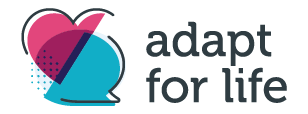
I’m an Educator
We support educators by:
Giving you the expertise and materials necessary to deploy the program either in person, virtually, or in a blended approach.
Helping you understand your own feelings, thoughts, and behaviors for greater self-awareness as well as those of your peers and students.
Providing a mental health and wellbeing curriculum that integrates Ohio SEL and PBIS competencies.
Guiding you on how to have the conversation about mental health with your students.
Adapt for Life offers educators mental health and wellbeing resources intended to help you help your students. We equip educators with the information and tools they need to practice healthy behaviors that students learn from the program, in class.
ADAPT Framework:
A Structure for Helping Yourself or Others
As part of the Adapt for Life program, students learn the difference between adaptive and maladaptive behaviors and how those behaviors cause certain outcomes. Our program focuses on achieving desirable outcomes by making healthy, adaptive choices. But what do you do in times of struggle when it can be difficult to understand how we got there and what’s going on?
In moments of stress, it can be difficult to make healthy, adaptive choices. The ADAPT framework was created to help students—and people of all ages—develop healthy behaviors and important life skills for managing stress. You can use the ADAPT framework to tackle stress during everyday moments or in times of crisis.
Statistics for Educators
Many educators have experienced the changing needs of students and there are heightened demands placed on schools to be more than a place of learning and it’s faculty to do more than just teach. In fact, most educators are responsible for advocating and ensuring the wellbeing of their students—this includes their mental health.
Research indicates that mental health affects a student’s ability to do well. Proper support for those who are coping with mental health conditions can help them perform better and achieve the education needed to be successful in life.
As early as pre-kindergarten, school performance begins to be affected by children’s mental health conditions. Especially impacted are those students without access to mental health professionals. Studies also show students who lack access to mental health professionals are 89% more likely to be expelled.
Mental health and learning disorders are tied to higher dropout rates. The dropout rate for all students is 7%; for students served under the Individuals with Disabilities Education Act (IDEA), it is over 21%; and for students served under IDEA who also experience emotional disturbance, the dropout rate climbs to more than 38%. School dropout also appears to be a factor in who winds up in prison as high-school dropouts are 63 times more likely to be jailed than four-year college graduates.
Only 16% of all children receive any mental health services. Of those receiving mental health care, 70-80% receive that care in a school setting. Nationally, only 40% of students with emotional, behavioral, and mental health disorders graduate from high school, compared to the national average of 76%. Over 50% of students with emotional and behavioral disabilities ages 14 and older drop out of high school. This is the highest drop-rate of any disability group!
Read more statistics on mental health and mental illness to find out just how common mental health conditions are and the impact.
Adapt for Life Can Fill the Mental Health Gap
Research suggests that schools may be functioning as a de-facto mental health system for children—often without the proper funding or resources to make lasting, systemic, positive change. It’s important to note that schools—and educators—play an important role in the mental health of children and adolescents. Learning about the early indicators and symptoms of an emerging mental health condition and in linking students with effective services and supports, as well as getting parents involved, makes you critical to the process of ensuring students’ wellbeing. Adapt for Life was designed to help fill a gap in the mental health space by bringing mental health education to students and staff to achieve lasting results.

